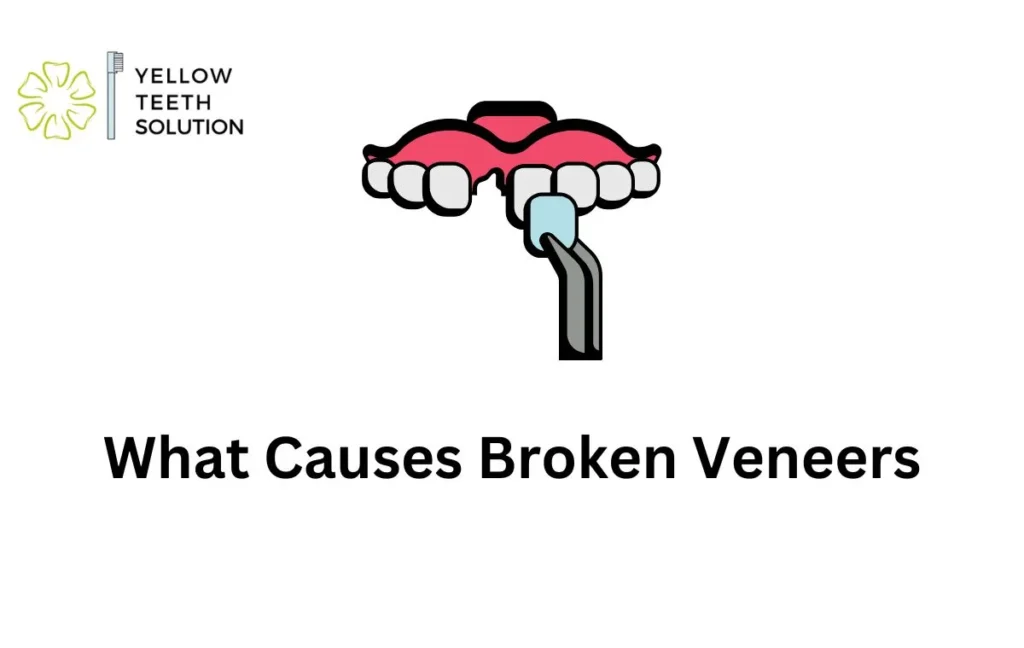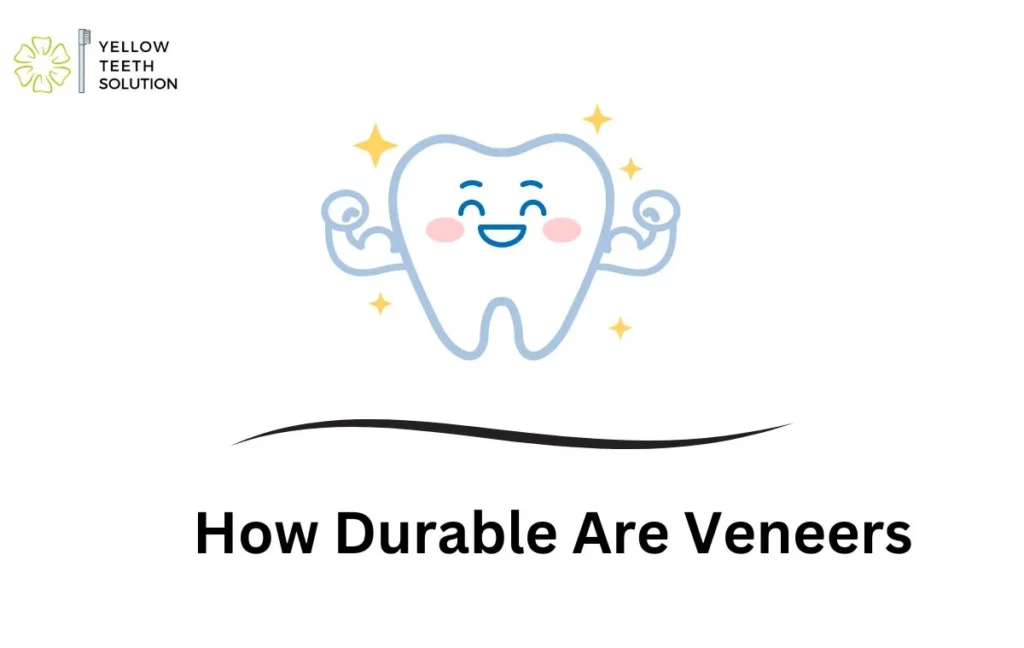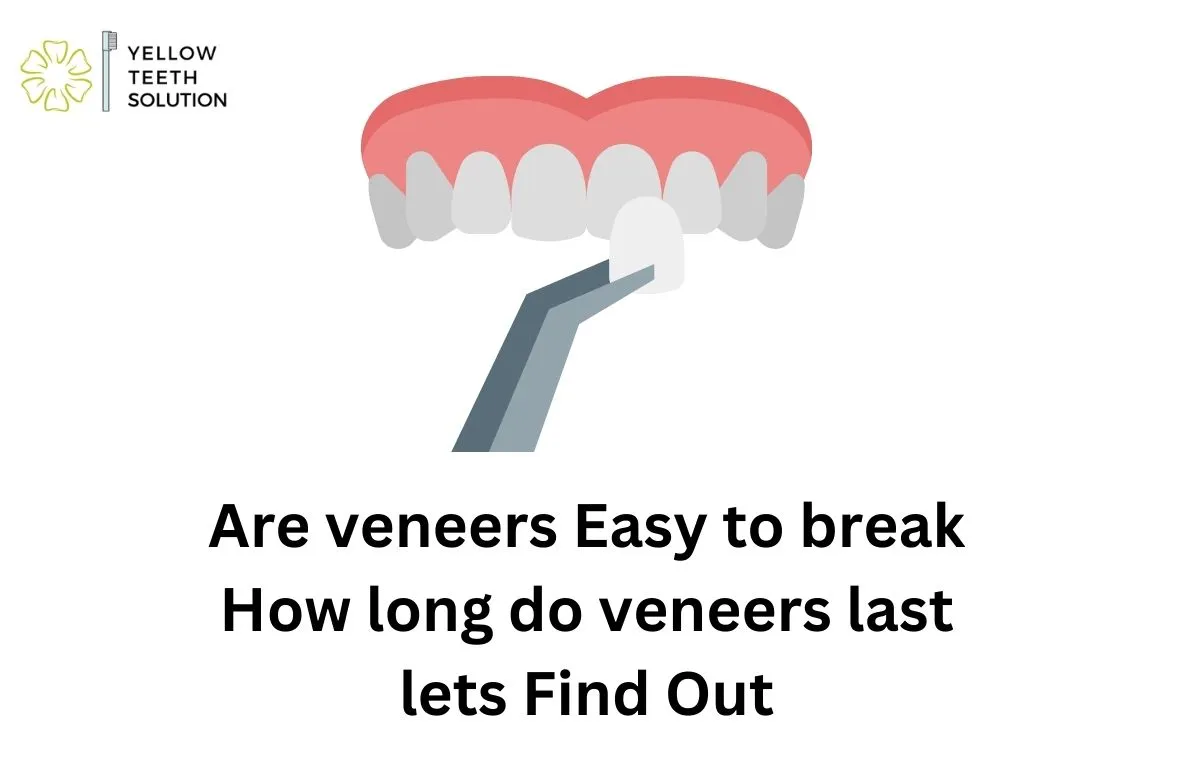A common concern clients have is whether are veneers easy to break? Let’s take a deeper look at veneers breakage,Veneers are not easily breakable when properly installed. Veneers are custom-made from very durable dental porcelain, which can withstand significant forces from normal chewing and biting.
When bonded expertly to the teeth, veneers form a strong, resilient restoration that fuses them securely in placeOn average, a dentist can estimate that porcelain veneers placed by an experienced cosmetic provider will retain their enhanced aesthetic appearance for 10-15 years.
Dentists report that with excellent oral hygiene like regular cleanings and proper brushing/flossing, most patients enjoy natural-looking veneers for their full projected lifespan with minimal maintenance needed.
Micro-cracks or larger fractures could occur if strong impact trauma hits the veneers, but this would not be a common occurrence. Overall, properly cared for veneers have strong bonding to teeth and low risks of fracturing under normal functions like eating if routine hygiene is followed.
By understanding the actual strength of dental veneers, patients gain confidence these restorations won’t require ultra delicate handling. Overall maintenance focuses on good prevention habits to maximize the beautiful results.
How long a porcelain veneer last
Veneers are designed to last 10-15 years only
Modern veneers have the ability to transform smiles beautifully for many years when done right. On average, a dentist can estimate that porcelain veneers placed by an experienced cosmetic provider will retain their enhanced aesthetic appearance for 10-15 years.Their material is engineered to withstand daily chewing without compromising over thousands of hours.
Dentists report that with excellent oral hygiene like regular cleanings and proper brushing/flossing, most patients enjoy natural-looking veneers for their full projected lifespan with minimal maintenance needed.They’re made from extremely strong porcelain that reinforces tooth structure.
Their material is extremely hardy and bond very securely to teeth. Dentists report most patients enjoy veneers for 12-15 years or more with good home care. The porcelain withstands everyday mastication forces well due to durable composition and precision inlay technique.
Veneers may show some slight changes over a decade plus but typically continue looking straight, white and natural for outstanding return on investment. Even after that they often require solely touch-ups. Naturally, truly forceful impacts, teeth grinding without protection or poor oral hygiene can potentially undermine longevity. Yet for most, veneers gift gorgeous grins for an impressively extended time period when overseen by experienced dentistry.
Regular checkups and daily hygienic habits like brushing, flossing, cleaning between teeth optimizes that porcelain’s designed longevity and resilience is fully realized for each individual. Your transformed smile will last a great many years!
What Causes Broken Veneers?

Here are some common reasons why dental veneers can break:
- Grinding/Clenching. Excessive teeth grinding or clenching at night can put extra pressure on veneers over many years and lead to microcracks that propagate into bigger problems.
- Trauma. A direct impact injury from taking a fall where your face hits or getting hit in the mouth can potentially fracture a veneer.
- Hard/Sticky Foods. Eating extremely hard, brittle foods like ice or overly chewy/sticky candy puts emphasis on individual teeth and veneers rather than distributing force across many teeth when chewing.
- Plaque Buildup. Excessive plaque and tartar buildup under gums can create inflammation and cause the bonding between veneer and tooth to weaken over time if not properly removed.
- Cracks in Existing Tooth Structure. Underlying cracks in tooth enamel or previous fillings can cause new stresses on veneers during function and eventually lead to breakage.
- Porcelain Defects. On rare occasions, there may be small subsurface defects in the porcelain material itself that aren’t visible but can initiate cracking. This is not common.
- Dental Work Accidents. Chip or fracture can result from an accident during procedures like polishing or adjustments by the dentist.
How to Prevent Your Veneers From Breaking
Gentle Cleaning Technique
It’s crucial to clean your teeth without using excessive force after eating. Use a soft-bristled toothbrush and brush in gentle circular motions, avoiding harsh back-and-forthscrubbing. Also purchase an interdental brush or floss threaders to thoroughly clean between teeth and under gumlines daily. This removes food but without putting undue pressure on the veneer material or bond.
Dietary Adjustments
Certain crunchy, sticky or acidic foods should be minimized. Avoid biting directly into things like popcorn, ice cubes, chips, or caramels. Instead cut these into small, chewable pieces and chew away from the veneers.
Also limit citrus fruits and juices, tomatoes, vinegar and other highly acidic items which can weaken the bond over months/years if consumed frequently and not rinsed promptly. When eating these rarely, always rinse your mouth out with water afterwards.
Custom-Fit Mouthguards
For contact sports, extreme grinding or chewing habits, protect your veneers with a customized mouthguard made by your dentist. Soft boil-and-bite guards won’t suffice. Have a mold done to create a precise-fitting rigid guard from durable plastic.
Replace them every couple years as the material can break down, losing shock-absorbing properties. Wear this reliably during sports, grinding or other high risk activities.
Routine Check-Ups
Schedule regular six-month cleanings and check-ups to your dentist. They will thoroughly clean and inspect the veneers and bond under lighting/magnification. Any small chips or cracks that arise can often be repaired at this stage before leading to a veneer coming loose or failing prematurely if unchecked.
Early intervention is key to maximizing the lifespan of veneers. With preventive care and smart habits, your veneers should stay intact for many years. But always contact your dentist with any specific concerns that come up too.
Are veneers easy to break
Are veneers easy to break? Veneers are actually quite durable and not very easy to break. Veneers are custom-made from very tough materials like porcelain or dental composites. When a skilled dentist precisely bonds them, it creates a strong, long-lasting restoration. Properly placed veneers can withstand normal chewing forces without issue.
Of course, nothing is totally unbreakable. Really strong impacts from falls or getting hit in the mouth could potentially crack or fracture a veneer. Other things like grinding teeth at night due to stress could exert additional wear over many years. But for normal usage like eating, veneers are designed to be resilient.
Most dentists report veneers lasting 10-15 years on average before potential replacement. Following the dentist’s home care instructions is important too. As long as normal precautions are taken, veneers should withstand typical chewing and impacts from food without issue. They’re very durable when done right! Occasional chips may happen, but full fractures are really not that common.
How Durable Are Veneers

One common concern may have about porcelain veneers is how durable they are compared to natural teeth. The good news is that modern veneer materials and bonding techniques actually make them highly long-lasting when properly applied.
Most dentists report their patients’ veneers routinely surviving 10-15 years or more before any potential replacement may be needed due to usual wear over many years. Some even last upwards of 20 years with excellent homecare. This longevity is due to the strength of materials like dental porcelain, which bonds very hard and dense to underlying tooth structure. When a skilled lab crafts veneers and a dentist meticulously secures them, it creates a resilient and crack-resistant facade.
Of course, severe teeth grinding without protection or major impact trauma could reduce veneer durability in some cases. But for average home and work lives, they can withstand typical biting forces decade after decade with good hygiene habits. With proper placement, follow-up care, and avoiding excessively hard foods, most find their veneers do not chip or fracture easily whatsoever due to basic chewing or lifestyle activities.
Overall, people are happily surprised by just how tough they truly are. Does this help provide a better perspective on typical veneer lifespans and durability? With responsible care, they remain exceptionally long-lasting smile systems.
How much do teeth veneers cost
If you’re considering dental veneers to enhance your smile, one of your main questions is likely around the associated costs. The good news is that modern materials and techniques allow cosmetic dentistry like veneers to transform grins affordably for many. Here’s a brief overview of typical veneer price points.
For a single veneer tooth, expect to pay anywhere from $500-$1000 installed. This covers the custom fabrication and placement. Material choices like porcelain or composite resins factor in. If addressing just your top or bottom six front teeth, anticipate spending $2500-$5000 usually. Covering the full upper or lower arch alone averages $5000-$7500.
Veneering all of your top and bottom front teeth together is projected at $8000-$15,000 normally. This provides a fully “Hollywood” smile makeover. Keep in mind additional costs if initial preparations like fillings or extra cleanings are needed first. Location, experience, and lab fees do influence the final bill too.
Key takeaways
- When installed properly by a dentist, veneers are not veneers Easy to break under normal chewing or wear. The porcelain and resin materials can withstand typical forces.
- On average, porcelain veneers are rated to maintain your new smile aesthetics for 10-15 years before any potential replacement.
- Maintaining excellent oral hygiene through regular professional cleanings and proper brushing/flossing is important for veneers to reduce risks of veneer breaking.
- Veneers are not Easy to break if you carefully manage habits like teeth grinding or wearing a night guard. This helps distribute forces versus concentrating them on single teeth.
- Being mindful of dietary choices and avoiding hard impacts further decreases already low risks of veneer fracture from normal usage. Seeking prompt care if cracks do arise allows for repairs.

